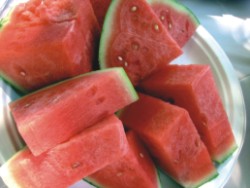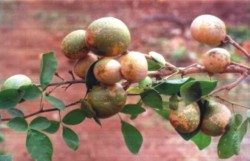|
Health
Fruits for Health
 Watermelon is a natural source of the most powerful antioxidants provided by nature. It is a good source of the antioxidant vitamins C and A to protect us from diseases. It reduces the risk of dehydration. Watermelon is a natural source of the most powerful antioxidants provided by nature. It is a good source of the antioxidant vitamins C and A to protect us from diseases. It reduces the risk of dehydration.
Summer and watermelon are inseparable. Watermelons are found almost everywhere in the world. Although we can find watermelons in our markets throughout the year, the season for watermelon is the summer when they are sweet and of the best quality. No other fruit can we find so crunchy and thirst quenching like watermelon.
Here are some very good reasons to eat watermelons this summer.
1. The health benefits of watermelon are really great. No matter how it is sliced, it is packed with some of the most important antioxidants found in nature.
2. It is an excellent source of vitamin C and a very good source of vitamin A, particularly through its concentration of beta-carotene.
3. The beautiful red watermelon is also a source of the potent carotene antioxidant which is called lycopene. These antioxidants travel throughout the body neutralizing free radicals. Free radicals are substances in the body that can cause much damage to us. They are able to oxidize cholesterol, making it stick to blood vessel walls and thicken them which can lead to heart attack or stroke. The lycopene which gives fruits the attractive red colour that we find in watermelon can help reduce the risks of prostate cancer.
4. It is a surprising fact that watermelon is the only fruit that contains higher concentrations of lycopene than any other fresh fruit or vegetable.
5. Watermelon is a fruit that is rich in electrolytes sodium and potassium that we lose through our perspiration.
6. Watermelon is rich in the B vitamins necessary for energy production. Food experts recommend watermelon as a very good source of vitamin B6 and a good source of vitamin B1 and magnesium. Because of its higher water content approximately ninety percent and calorie value it is ranked more valuable than other fruits.
7. Watermelon has a special cooling effect and is exceptionally high in citrulline, an amino acid that our bodies use to make another amino acid, arginine, which is used in the urea cycle to remove ammonia from the body.
8. The antioxidants help reducing the severity of asthma. It also reduces the risk of colon cancer, asthma, heart disease, rheumatoid arthritis, and prostate cancer.
9. Watermelon is a good source of thiamine, potassium and magnesium which protect our body from so many diseases.
10. Watermelon is fat free but helps energy production. It protects against macular degeneration.
When the heat of summer tires us with thirst, eating watermelon is a safe alternative to taking energy drinks. Since it contains high water quantity it can hydrates us whereas other drinks are caffeine filled energy drinks, which can easily dehydrate us. Nothing can be more satisfactory on a hot, dusty day than a crisp, juicy slice of watermelon!
source: www.healthmad.com
The natural benefits and curative properties of bael fruit
 The bael tree is one of the most useful medicinal plants of India. Its medicinal properties have been described in the ancient medical treatise in Sanskrit, Charaka Samhita. All the parts of this tree including stem, bark, root, leaves and fruit at all stages of maturity has medicinal virtues and has been used as traditional medicine for a long time. The bael tree is one of the most useful medicinal plants of India. Its medicinal properties have been described in the ancient medical treatise in Sanskrit, Charaka Samhita. All the parts of this tree including stem, bark, root, leaves and fruit at all stages of maturity has medicinal virtues and has been used as traditional medicine for a long time.
The fruit is of considerably medicinal value when it just begins to ripen. The ripe fruit is aromatic, astringent which helps construction of skin, coolant and laxative. The unripe or half-ripe fruit is astringent, digestive stomachic which improves appetite and antiscorbutic, i.e. which helps to fight scurvy caused due to vitamin C deficiency.
Constipation
Ripe bael fruit is regarded as best of all laxatives. It cleans and tones up the intestines. Its regular use for two or three months helps evacuate even the old accumulated faecal matter from the bowels. For best results, it should be taken in the form of sherbat, which is prepared from the pulp of the ripe fruit. After breaking the shell, the seeds are first removed, and contents are then taken out with a spoon and passed through a sieve. Milk and little sugar may be added to make it more palatable. The pulp of the ripe fruit can also be taken from the spoon without the addition of milk or sugar. About 60 grams of the fruit will suffice for an adult.
Diarrhea and Dysentery
The unripe or half ripe fruit is perhaps, the most effective food remedy for chronic diarrhea and dysentery where there is no fever. Best results are obtained by the use of dried bael or its powder. The bael fruit, when it is still green, is sliced and dried in the sun. The dried bael slices are reduced into powder and preserved in air-tight bottles. The unripe bael can also be baked and taken with jaggery or brown sugar.
The fruit appears to have little effect in acute dysentery when there is definite sensation to defecate but instead of significant amount of faeces, blood and mucus alone are passed. The powdered drug is specially recommended in this condition. Its beneficial effect its, however, most evident when the condition has become sub-acute or chronic. After the use of the fruit in these conditions, the blood gradually disappears and the stool assume a more feculent and solid form. The mucus also disappears after continued use for some time. It is also a valuable remedy for chronic dysenteric conditions characterized by alternate diarrhea and constipation.
Peptic Ulcer
An infusion of bael leaves is regarded as an effective food remedy for peptic ulcer. The leaves are soaked overnight in water. This water is strained and taken as a drink in the morning. The pain and discomfort are relieved when this treatment is continued for a few weeks. Bael leaves are rich in tannins which reduce inflammation and help healing of ulcers. The bael fruit taken in the form of beverage has also great viscous content. This substance forms a coating on the stomach mucosa and thus helps in the healing of ulcers.
Respiratory Afflictions
A medicated oil prepared from bael leaves gives relief from recurrent colds and respiratory affections. The juice extracted from bael leaves is mixed with equal quantity of sesame oil and heated thoroughly. A few seeds of black pepper and half a teaspoonful of black cumin are added to the hot oil. It is then removed from the fire and stored for use when necessary. A teaspoonful of this oil should be massaged into the scalp before a head bath. Its regular use builds up resistance against colds and coughs.
A common practice in south India is to give the juice of bael leaves to bring relief from wheezing and respiratory spasm. The leaf juice, mixed in warm water with a little pepper, is given as a drink.
source:www.asianonlinerecipes.com
Copyright
(R) thedailystar.net 2009
|
